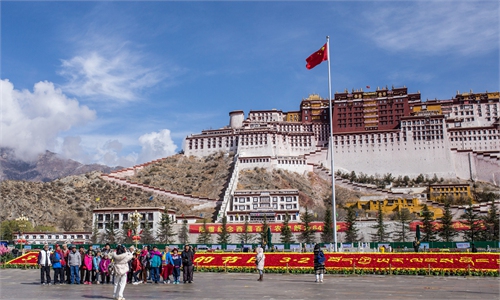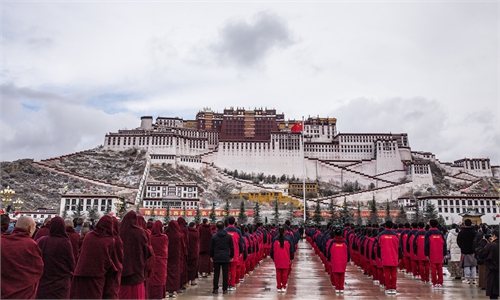IN-DEPTH / IN-DEPTH
GT investigates: Contrary to Western smears, boarding schools offer students in rural Xizang access to quality education, opportunity to change life
Classroom on plateau
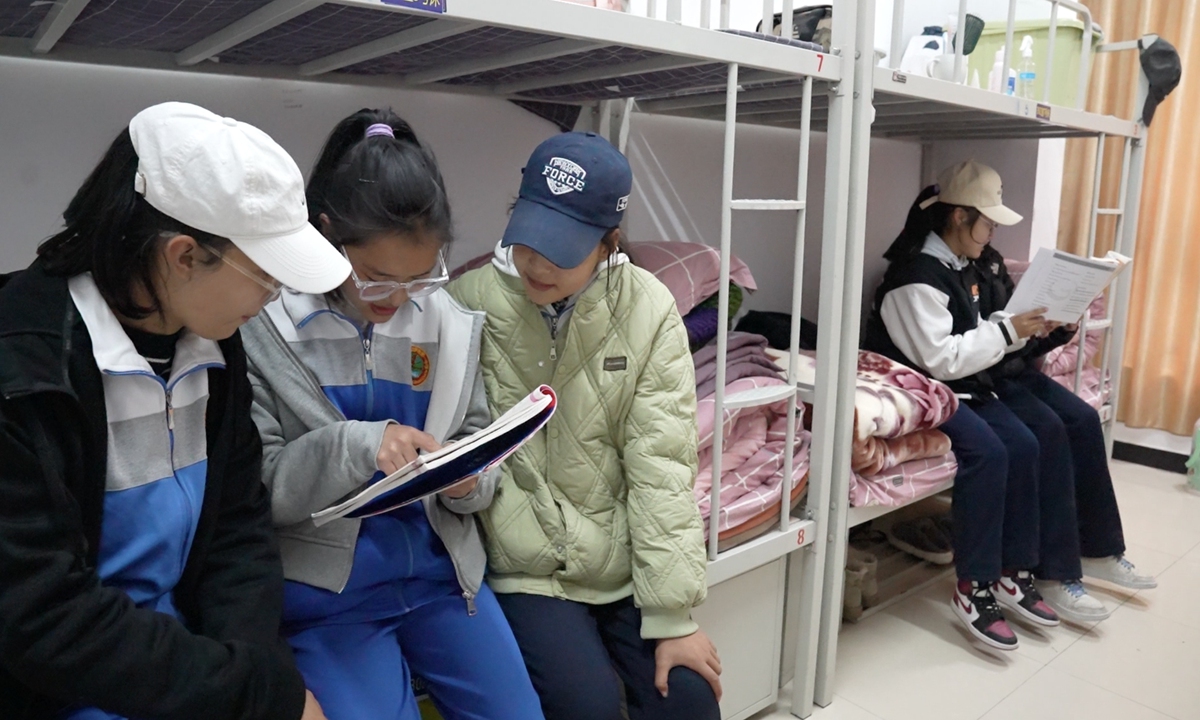
Gasong Cuojia (second left) and her classmates study in a dormitory on March 21, 2023 in No.1 Middle School of Lhasa. Photo: Li Jieyi/GT
She excitedly shared the detailed events of the week at school and in her dormitory with her father, in fluent Tibetan - her mother tongue.
The 16-year-old student is in ninth grade at the Lhasa No.1 Middle School in the capital city of Southwest China's Xizang Autonomous Region. Since September 2022, Gasong, along with most of her peers in the same grade, has chosen to live in the school in the eastern suburb of Lhasa.
In recent months, the topic of "boarding schools" in Xizang has become a pointed term, as some Western media sources and organizations have hyped the false narratives of "children being forcefully separated from their parents leading to Tibetan children forgetting their native language and making the children effectively unable to communicate with their families."
However, while visiting a boarding school in Xizang recently with these claims in mind, the Global Times reporters found these allegations to be entirely false, and nothing more than yet another slander by Western media sources.
Boarding schools in Xizang in fact help students from remote areas fulfill the need for formal education in a region with uniquely extreme and harsh environmental conditions.
Not only is the teaching of the Tibetan language an important part of Xizang's schools, but so is the effective passing down of the region's traditional culture to local children.
Moreover, the students with whom the reporters interacted enjoy their days in school and express this fact confidently. They understand that they need to work hard in school to realize their full potential.
A reasonable choice
Neither of Gasong's parents speaks much Putonghua.
The couple which owns and runs a small grocery store in central Lhasa has met with language barrier difficulties in the past. Gasong has seen it herself.
The family is originally from a farming and herding area in Jiangda county, Changdu, Xizang, and chose to seek a better life and better education for their children in the big city. They understand the importance of education and have high expectations for their children.
As a student in the ninth grade, Gasong grapples with the expected pressures of securing a spot at a good high school, which will be determined by results from the entrance exam to be held in June. Moreover, the school is about half an hour's commute from her home. Therefore, out of convenience, Gasong chose to board at school.
"I live in school five days a week and go home every Friday," she said. "My parents do not worry about me living here at all. They know that I am safe here and can focus more on my study."
After several months, Gasong has adapted to boarding school life and is good friends with her four roommates.
"They are all very funny," Gasong told the Global Times. "The dormitory is like a home and we always have fun."
The girls usually speak Tibetan to each other, but when it comes to formal things, they switch to Putonghua.
Even though they live under the same roof, the four girls each have their own dream: Dekyi Paldron wants to show her talent in Tibetan opera, Tsering Dekyi aims to become a prosecutor, and Namgyal Yutso wishes to follow her mother's path by becoming an educator.
Gasong, however, is interested in languages and dreams of becoming a Tibetan language teacher or a linguist. "I will go to university and come back to my hometown," she said.
Tibetan is one of the most important courses for Gasong and her classmates. In the upcoming high school entrance exam in June, both Tibetan and Putonghua courses will be equally graded.
The most suitable mode
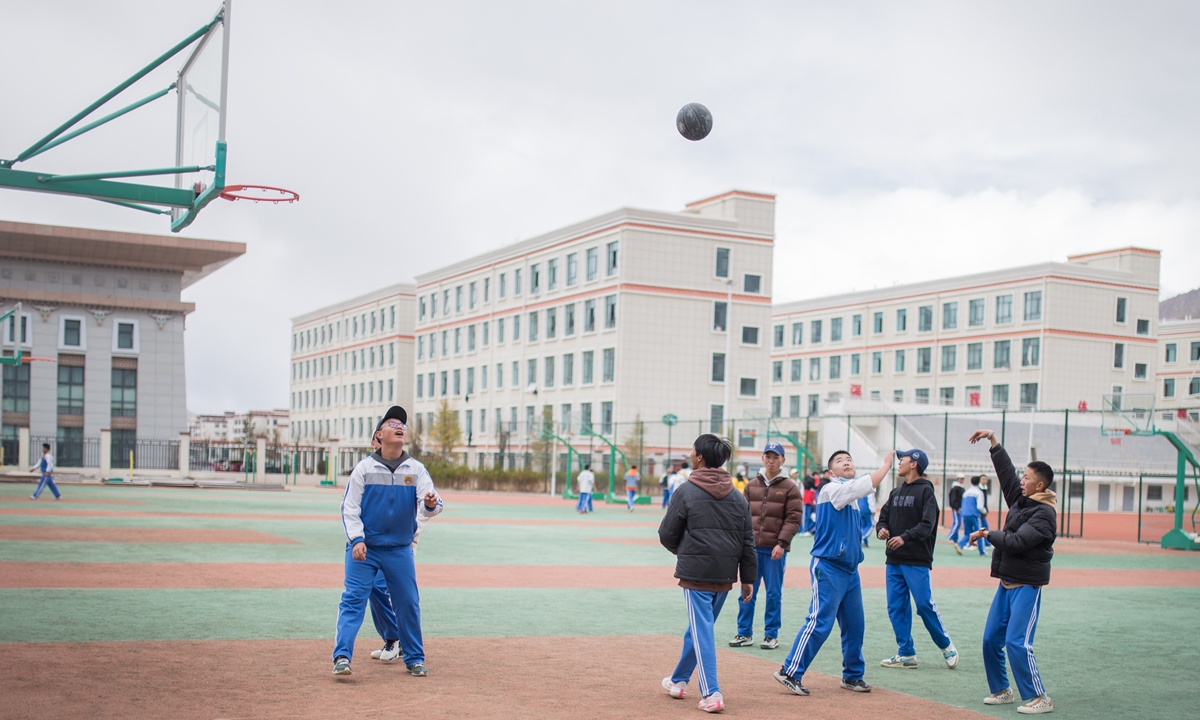
Students enjoy sporting activities at the No.1 Middle School of Lhasa on March 21, 2023. Photo: Shan Jie/GT
Gasong's experience is a microcosm of many children from remote areas in Xizang.Zhaluo, head of the social economy institute of China Tibetology Research Center, recently explained in an interview with the Global Times that boarding schools are common in Xizang because of the region's unique population distribution and geographical conditions.
"As residents are scattered, it is difficult to provide proper education in every place. Additionally, the mountainous terrain in Xizang makes commuting to and from school inconvenient for students. Experience has shown that gathering students together in boarding schools is the most effective way to develop education in Xizang," Zhaluo said.
"The development of education has its own laws, and the provision of education in a region depends on the unique geographical environment and cultural endowment of that region." Lajia Zhoudang, Deputy Dean of School of Marxism with the Sichuan Minzu College, noted. "The boarding school system is currently the most ideal, effective, and efficient mode of education for Tibetan children under current conditions," he said.
Xizang has a vast territory but a sparse population, with only over 3.6 million people living in an area of 1.2 million square kilometers of land, and an average population density of about 3 people per square kilometer. In most remote areas, population density is even lower.
To further increase equal access to quality education resources for people in different areas in Xizang, a combined model of day and boarding school education has been adopted.
Taking boarding schools as an example, this model has largely overcome the challenges of uneven geography, distance and accessibility, and educational resources in Xizang, and prioritized the meeting of various ethnic groups' needs for modern and high-quality education, thus addressing the issues of difficulties in enrollment and educational facility access in the most comprehensive way, according to Lajia Zhoudang.
"Allowing the children of farmers and herdsmen in remote areas to live in school can minimize safety concerns attached to traveling on mountain roads every day. Only when students are safe can parents be confident in sending their children to school," said Zhaluo.
A senior education worker in Xizang told the Global Times reporters that Xizang has been exploring various methods to develop education under its unique conditions for decades, such as teachers traveling to teach on horseback in the grasslands, homeschooling, tent schools, learning held during agricultural downtimes, and night schools.
In the 1980s, after researchers, experts, and officials suggested that boarding schools should be the main form of education, and the central government would provide financial support, boarding schools have since developed rapidly.
Lajia Zhoudang, who is also a beneficiary of the boarding school system, listed several advantages of the system in Xizang.
First, the boarding school system is very flexible, with students staying at school from Monday to Friday and returning home for two days at weekends. Second, the curriculum is scientific and well-structured, which includes not only universal courses for various age groups, but also various forms of courses featuring Tibetan folklore, Tibetan calligraphy, or Tibetan proverbs, allowing students to not only gain modern scientific knowledge but also to access the essence of traditional Tibetan culture. Third, the learning environment is well-equipped and includes infrastructure construction, modern teaching equipment, as well as classrooms, and teaching equipment featuring traditional Tibetan culture. Additionally, attention is paid to students' nutrition through the provision of a balanced diet.
The Global Times reporters found, in a local boarding school in Lhasa, that Xizang has fully implemented the "three guarantees" policy of free compulsory education for 15 years, which covers study expenses.
This supportive policy for boarding education has significantly reduced the educational burden on many families and has positively stimulated parents' willingness to send their children to school. This is also an important reason for the continuous increase in the enrollment rate in primary and secondary schools in Xizang.
Before the peaceful liberation of Xizang in 1951, the enrollment rate of school-age children was less than two percent while the illiteracy rate was as high as 95 percent.
In 2020, Xizang has an 84.42 percent rate in preschool enrollment, a 99.71 percent rate in primary school enrollment, a 102.88 percent rate in middle school (it is over 100 percent due to those starting education late or having to repeat academic years), an 86.62 percent rate in senior high enrollment, and a 47.65 percent conversion rate to college or university, according to the Xinhua News Agency.
"It can be said that boarding education in Xizang is standardized and full of care. In fact, boarding schools in Xizang are very popular with local residents. People generally regard it as an honor for their children to be admitted to high-level boarding schools," Zhaluo said.
Maintaining talent for Xizang
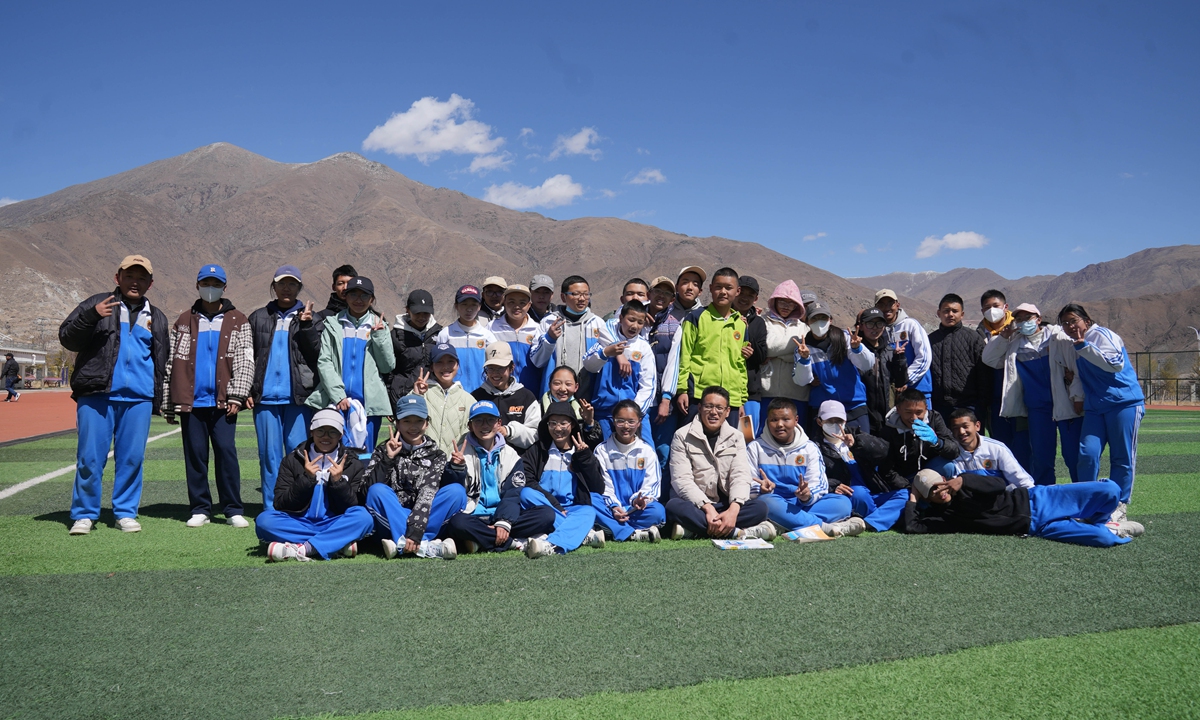
Gasong and her classmates have a photo taken after a physical education class on March 24, 2023 in No.1 Middle School of Lhasa. Photo: Li Jieyi/GT
"My students have their own expectations. They have set goals to enter top high schools and universities," Jiayang Kere, Gasong's math teacher, told the Global Times. "They will return to Xizang to make contributions with their talents."Jiayang himself is an example of Xizang's pedagogical development.
Thanks to a policy urging Xizang's children to enroll in education, Jiayang, from Lhaze county, Xigaze, entered first grade at the late age of eight. "I was in the same class as my brother, who is four years younger," he said, noting that his parents who were farmers hadn't planned on sending him to school.
Jiayang treasured the opportunity to go to school and finally graduated from Tibet University. He became a teacher at the Lhasa No.1 Middle School seven years ago.
"I am from an extremely underdeveloped area, but my fate was totally changed by education," he told the Global Times.
Like the rest of China, Xizang is undergoing rapid development and needs talent from all fields.
"It is unimaginable to maintain so much high-quality talent without boarding schools. Xizang is stepping into modernization, increased access to quality modern education, and engaging in the growth of modern employment sectors are also the dreams held by thousands of young people in Xizang," Zha Luo noted.
In addition, boarding schools also maximize the education rights of the children of farmers and herdsmen in remote areas of Xizang. In Lhasa, the Global Times reporters met many students from remote rural areas such as the Qamdo, Ngari, and Nagqu regions who can also share high-quality educational resources with students in larger cities and receive equally good education.
"Boarding schools are just a way to run schools, and their content varies from place to place and from school to school. However, Western countries impose a kind of 'original sin' on boarding schools and smear the system," Zhaluo said.
"In fact, in other parts of the world, including Xizang and other parts of China, boarding education is diverse, and is full of vitality. It has provided many young people with an excellent environment for learning and growth, and has become the golden key to a brilliant life," he noted.
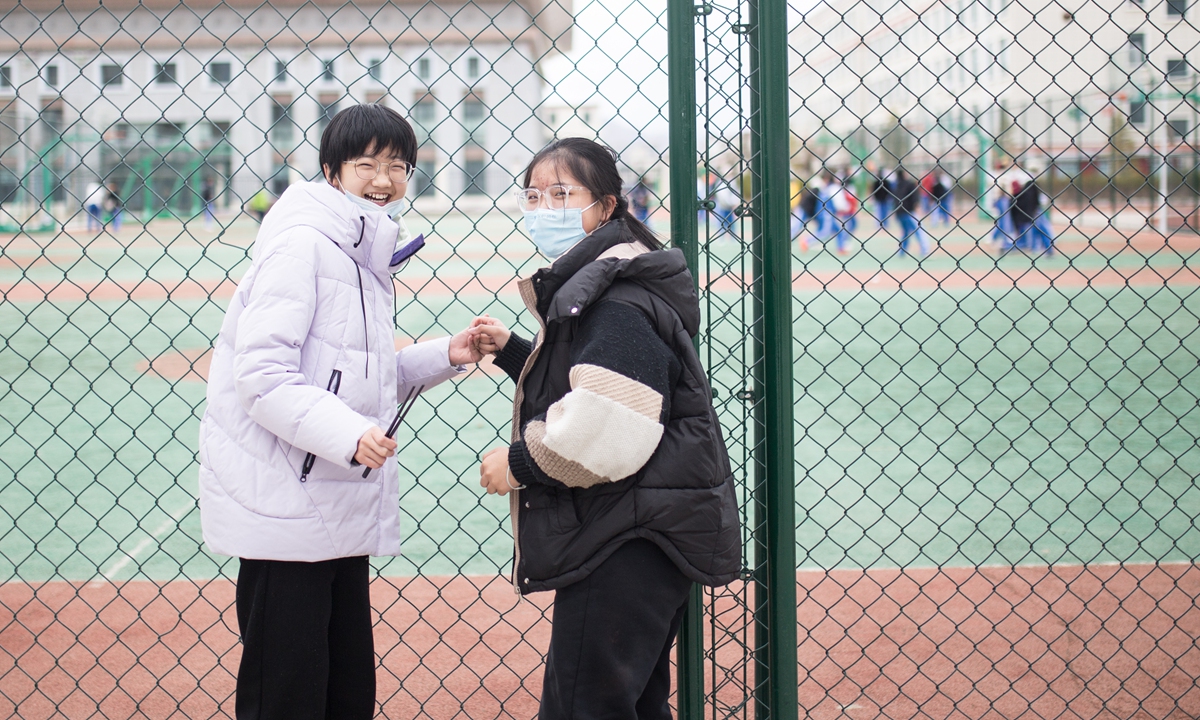
Students enjoy sporting activities at the No.1 Middle School of Lhasa on March 21, 2023. Photo: Shan Jie/GT


